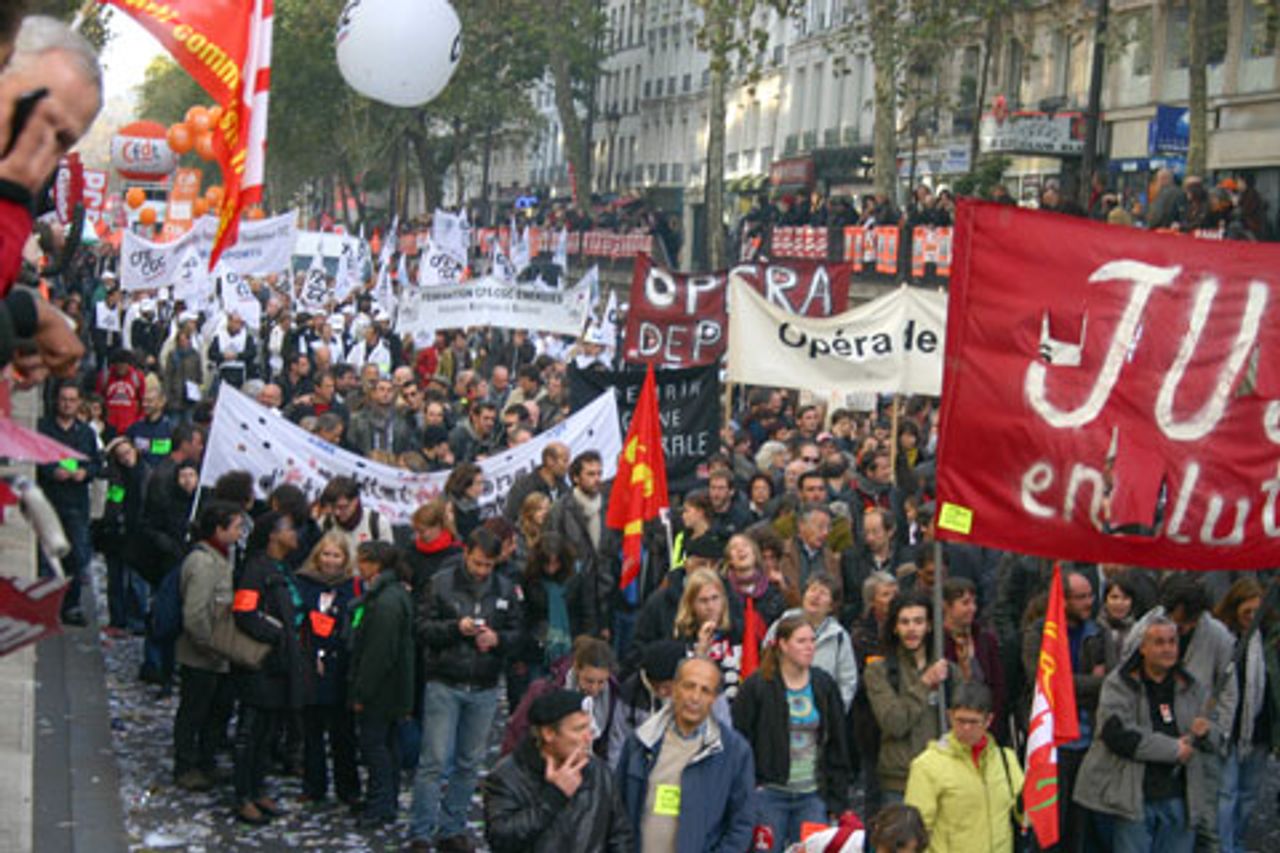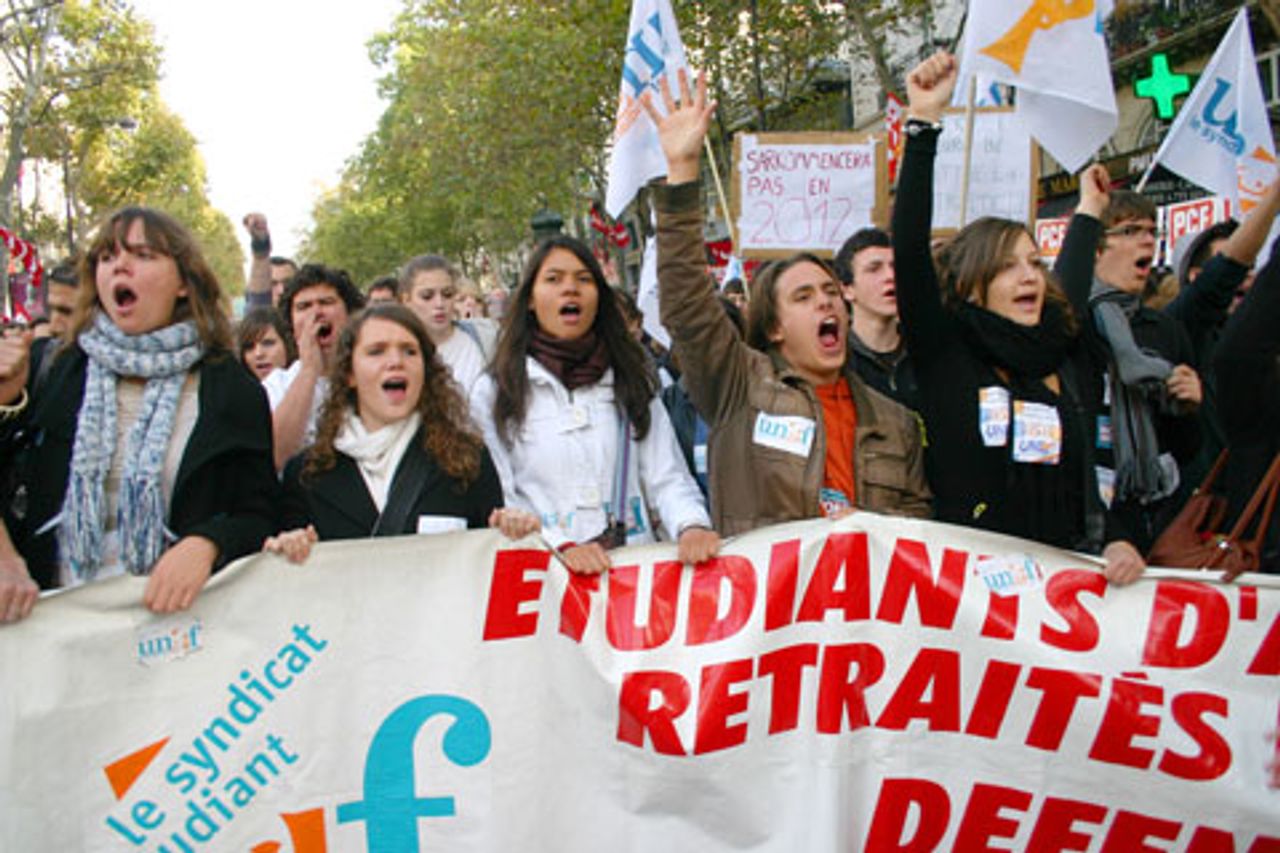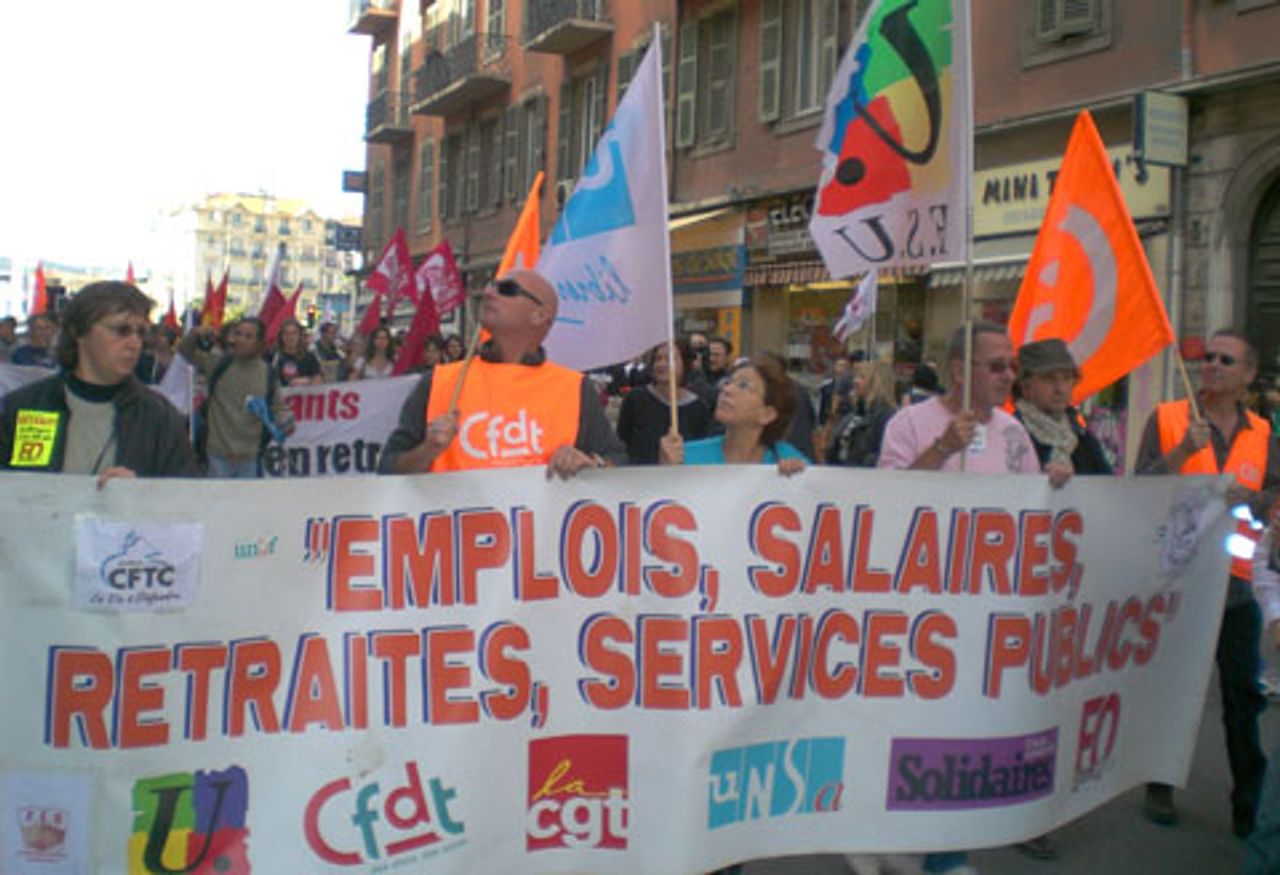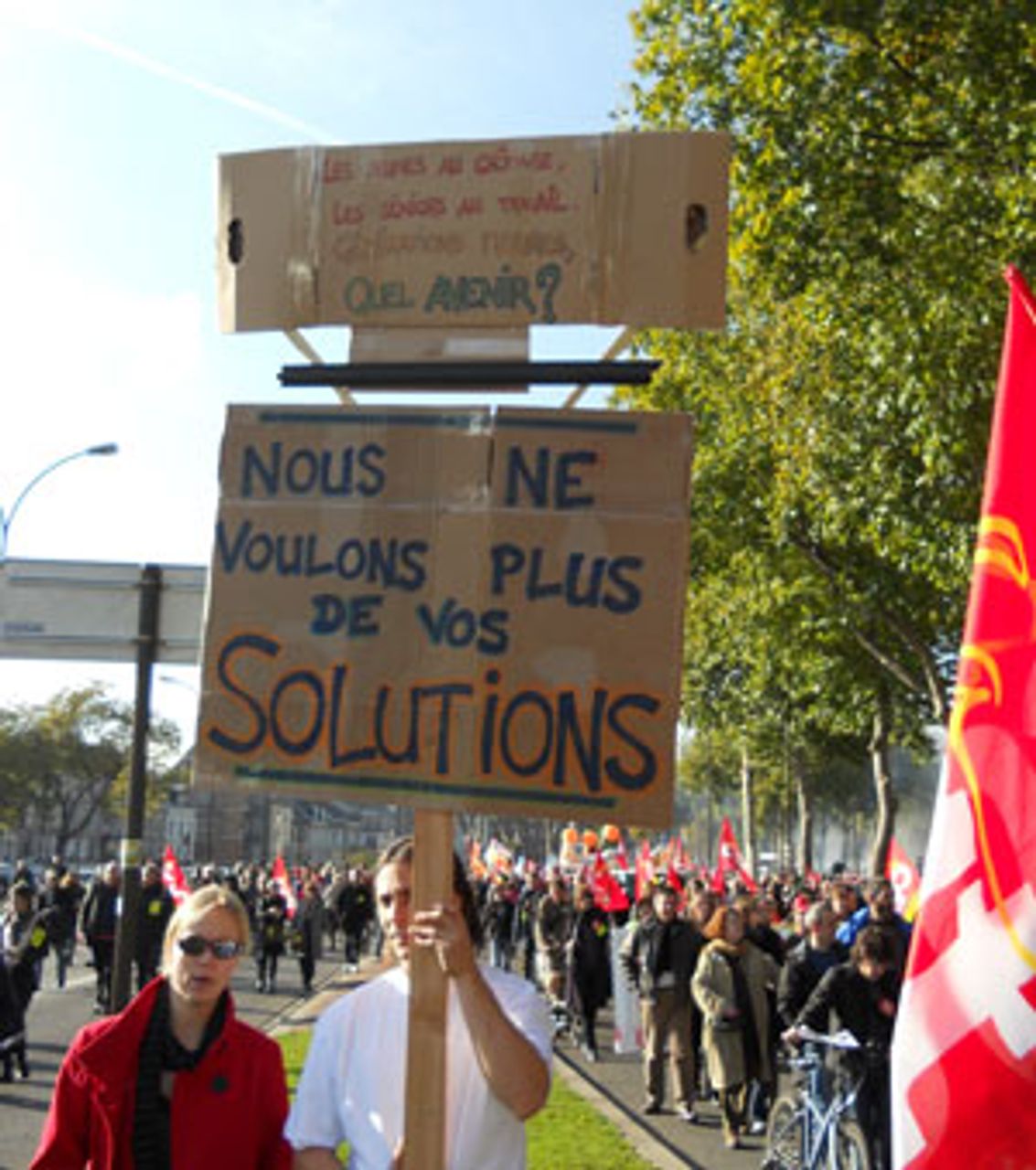 A section of the Paris march
A section of the Paris marchSome two million workers struck work and demonstrated in 270 marches throughout France on Thursday against President Nicolas Sarkozy’s pension “reform” bill. It was given its final vote on Wednesday in the National Assembly and is due to be promulgated on January 1, 2011.
Thursday’s mobilisation was the seventh national day of action called by the unions against Sarkozy’s pension legislation since September 7. It raises the minimum retirement age from 60 to 62, and the age to retire without a financial penalty from 65 to 67.
Despite considerable disruption caused by transport strikes, severe shortages of fuel at petrol stations, the mass movement, which has been mobilising more than three million workers in the previous days of action, continues to enjoy the support of over two thirds of the population according to opinion polls.
The Sarkozy government is at a record low 29 percent approval rating. Nonetheless, it has managed to pass the cuts because no real political opposition has been organized by the unions, bourgeois “left” opposition parties like the Socialist Party (PS) and the French Communist Party (PCF), or middle class ex-radical parties like the New Anti-Capitalist Party (NPA). Instead, all these organizations have united around a bankrupt and increasingly unpopular policy of appealing to Sarkozy to modify his cuts.
WSWS teams attended demonstrations in Paris, Marseille, Nice and Amiens and distributed leaflets with the article “Workers face a struggle for power in France.”
In discussions it was clear that many workers and youth are becoming aware of the bankruptcy and class collaboration of the official “left” and are searching for an alternative.
 Students marching in Paris. Placard reads: Sarko, you won't be starting again in 2012
Students marching in Paris. Placard reads: Sarko, you won't be starting again in 2012In Paris, where the unions estimated a turnout of 170,000, homemade banners and placards read: “All power to the municipalities”, “General strike until retirement.”
One sign criticized the PS for its right-wing pro-business policies, citing the name of Dominique Strauss-Kahn, also known as DSK. He is currently the head of the free-market International Monetary Fund and the PS’s likely presidential candidate in the 2012 elections. It read: “Sarkozy and Strauss Kahn the same fight, enemies of the working class, shame on the Socialist Party!”
Refinery workers on the demonstration made the point that their struggle was international, and spoke of the action by Belgian refinery workers to prevent their fuel being used to break the French workers’ strike. There were also Greek workers marching. One told the WSWS: “We face the same struggle everywhere.”
Catherine, a pensioner said: “I’m here to defend everyone. It’s an international question, no country is unaffected. Finance rules all, that’s what we have to deal with. That’s what moves me.”
Nicolas, a musician, supported the idea of a general strike. He criticized the unions, saying they “don’t want to fight, just negotiate.”
Danièle is a school librarian on a temporary contract. She explained: “It’s difficult not having a steady job. The idea that you can force Sarkozy to back down is not mine. You need to build the workers’ movement, workers’ democracy, and workers’ power. A general strike must be directed at overthrowing Sarkozy and the power of the employers. The trade union leadership is attached to the present system, so they don’t want it overthrown. The so-called left, including the NPA are also attached to the present system, that’s why they haven’t called a general strike.”
In Marseille the unions estimated turnout at 150,000, with contingents from hospitals, the engineering and steel and petrochemical industries, and education personnel, including students.
Many expressed agreement with the WSWS’s criticisms of the unions, and its call for building councils of action independent from the unions to organise a general strike to bring down Sarkozy and replace his government with a workers’ government.
 The demonstration in Nice
The demonstration in Nice
The WSWS spoke to a primary school assistant, who said she was not in a union: “I experienced [the general strike and student protests of] May ‘68. I don't think we can make the government back down. We must continue the struggle even if nobody’s listening.”
Nordine, a CGT electrician in the construction industry since 1971, said that “for years pressure from mobilisations had been used” by workers to try to force governments to do things. However, he recognised that this time the government “has managed to get the reform passed, but there will be problems.”
The WSWS spoke to Françoise, a member of the middle-class New Anti-capitalist Party (NPA). She expressed her hostility to the positions of the WSWS: “Industry run democratically by the workers, that’s utopian. I’m skeptical about breaking with the unions. I agree with the line of the NPA.”
She stated her support for Sarkozy’s xenophobic anti-Muslim campaign, in particular his ban on wearing the burqa. She explained: “One of the problems in Marseille, without being racist, is the amount of foreigners who work here. They are strong believers and celebrate Ramadan. I am secular and for the revolution, but not with Allah.”
She added: “I can’t stand the burqa. I refuse to have a woman wearing a burqa at my work!”
Françoise also made clear that she was hostile to the traditions of Marxism: “I refuse to read Trotsky, Lenin. I can’t stand them. Marx too.....I prefer to be in the fight, to work to sell products from the Chiapas cooperatives than to be into the dogmas. The NPA is a party which mixes everything but which can be good.”
The WSWS also spoke with Robin, 47, a non-unionized railway worker. He said: “The days of action are not effective. You see sectional outlooks, here for the nurses, there for the fire fighters. It’s a world problem, the dragooning of all peoples by a political and financial oligarchy which runs the world on the backs of the peoples.”
He criticized the unions and “left” parties, saying: “The unions are accomplices of the government. The PS could well send the army against the people. DSK [Dominique Strauss-Kahn, the head of the International Monetary Fund and likely next presidential candidate of the PS]—Sarkozy, it’s the same system.”
Speaking on Sarkozy’s ethnically-targeted deportation of the Roma, he said: “The persecution of the Roma is to destroy people’s judgment, to make them accept dictatorship.”
Robin was enthusiastic about the policies proposed by the World Socialist Web Site: “People must get involved. In 1789 the people would have shifted. I agree with committees of action. You’d have to make sure they weren’t contaminated too.”
 Amiens: Placards read: "Youth unemployed, seniors
Amiens: Placards read: "Youth unemployed, seniorsat work, future generations - what future?" and "We
want no more of your solutions"
In Amiens the unions estimated the turnout at 12,000. The WSWS spoke to Majid, who works at the Amiens Goodyear Tyre plant. It faces threats of 820 sackings. He has been active in the blocking of the industrial estate where his factory is located, as part of the fight against Sarkozy’s pension reforms. The CRS riot police have been used to clear the blockade.
He told us that the unions have opposed resisting this attack on democratic rights: “They ordered some 300 blockaders to disperse. The CGT gives no leadership. It does not use its funds, there are no strike funds and yet the unions have got billions. The unions don’t represent us. At the Donges refinery it was ordinary citizens who brought money to the strikers, not the unions.”
Speaking on political parties, he said: “The PS brought in the 35-hour week but introduced flexibility with it and opened the way for the destruction of our working conditions. … No party represents the working class. I don’t trust labels: Marxist, Trotskyist, Leninist. It’s the programme which counts. I agree with the WSWS on forming councils of action and to organise a general strike to bring down the government and replace it with a workers government. We need to get politically educated.”
On Wednesday the WSWS spoke to railway workers at their barricade and picket outside their Amiens depot, which they had maintained since the start of their strike on October 12. They dismantled them that afternoon, after over two weeks on strike.
Dominique was angry: “The union federations gave us no support. They isolated us.”
Sylvie commented: “SUD [Solidarity-Unity-Democracy, one of the main rail unions] used to present itself as a militant union, independent from the CGT, but it’s become bureaucratised”.
There was a strong presence of the railway workers at the head of Thurday’s demonstration. Arnaud, a young signalman, felt betrayed by the unions: “We’re going to have to learn the lessons of this struggle.”
Julien, a young teacher, demonstrating with a group of friends, was disappointed at the “lack of unity in the working class.” When the WSWS pointed out the refusal of the unions to call a political general strike to overthrow the Sarkozy government, he agreed that this would have had an enormous response. “I’ve read your leaflets. I agree with your analyses. It’s going to have to be an international struggle.”
Subscribe to the IWA-RFC Newsletter
Get email updates on workers’ struggles and a global perspective from the International Workers Alliance of Rank-and-File Committees.
